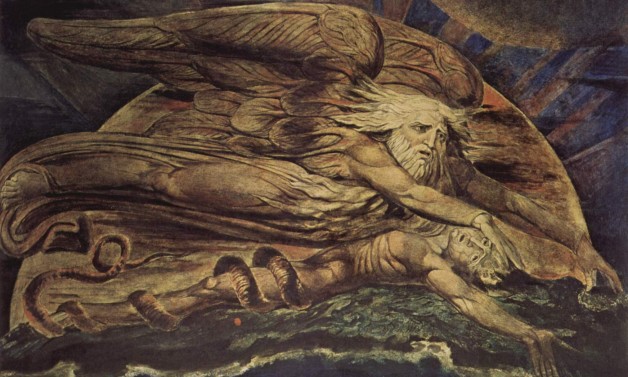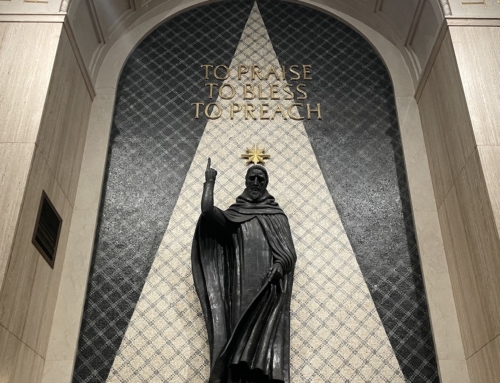Speaking about God, or even thinking of him, is perhaps the most difficult and lofty task that man can undertake. While God made us in his image, endowing us with minds and free choice, the capabilities to know and love him, we naturally fall short of understanding who, or even what, God is. Because of these natural limitations and the effects of sin, we have a tendency to remake God in our image.
Some faulty attempts to understand God, while based in truth to certain extent, can be exaggerated to the point that they drive people away from him, leading many to reject him or even deny that he exists. Let’s examine some of them more closely, and look at how speaking of what God is not sheds light on who he is.
The Cosmic Clockmaker: In trying to understand the mystery of creation, we try to picture God in terms of things we already know and can see on earth. One idea, most popular in the 18th century, is that of an Intelligence who crafts the universe according to deterministic physical laws. The problem with this idea is that it reduces creation to an isolated event in the distant past and disregards God’s action in the world today. God does not ignore his works, but rather, in his loving providence, draws all things back to himself, and even acts in our own free choices when we cooperate with his grace.
The God of the Gaps: Our scientific understanding of the world has increased to a level unforeseen to the pagans of ages past, who posited deities in charge of every aspect of nature. If any natural event escaped human knowledge, it was attributed to a divine cause. The problem then is relegating God to only the unknown, which makes his role shrink as our knowledge of science expands, leaving no gaps. Some conclude, then, that the world has no need for God, with some contemporary physicists even claiming that the universe can create itself from nothing. However, God is not the natural cause that they seem to look for. Rather, just as the act of creation transcends the order within creation, God is the supernatural First Cause that sustains us all in existence, and instead of ruling out God’s existence, modern science has merely proven the (true) conclusion that God is not part of nature.
The Divine Dictator: This one concerns the transmission of Sacred Scripture. We hear that the Bible is divinely inspired, and we conjure up pictures of winged cherubs whispering in the authors’ ears, telling them precisely what to write down, as it comes straight from the mind of God. In fact, other notable belief traditions have just this theory of inspiration. This can also cause trouble and doubt: if the Scriptures are a download from the mind of God, what do we think of passages that appear to contradict one another, or do not pass scientific or historical muster? But the Catholic tradition understands biblical inspiration in a radically different way. Biblical revelation operates on an incarnational principle: God does not simply dictate, but writes through human instruments, acting as the principal cause in the people who write the sacred texts, compile and edit them, or who ratify them by using them in worship of God. Each human author is partially conditioned to a specific place, time, culture and level of understanding, and we can even notice how the writers’ conceptualizations of God mature over time, evolving from a seemingly anthropomorphic deity among many national gods to the unique Creator who is totally Other from the universe. Despite the human character in which biblical revelation is offered to us, the Sacred Scriptures offer us objective truth that transcends any one historical period, indeed truth essential for our salvation. The process of revelation occurs throughout the Old Testament period and reaches its culmination in the Incarnation of the Son in Jesus Christ.
The Man Upstairs: Speaking of anthropomorphism, this common idea tries to picture God as having human attributes (including a long, white beard), sitting on a throne on high, and ready to smite us whenever we break one of his laws and ignite his wrath. One can readily see how this notion, which describes the thunderbolt-wielding Zeus more closely than the God of Scripture, drives seekers away and even disposes believers to rebel against God. However, God is not subject to human emotions; rather in his providential plan, he wills the salvation of the whole human race through our free cooperation. It is not God, but human beings who typically wield thunderbolts, human beings who sin by breaking the bond of friendship with God.
All of these ideas of God have a basis in truth, but are warped as our frail and finite minds try to comprehend the divine mystery. Rather than retreat from God when he turns out not to match our image of him or when our conceptions of him become twisted and troubling, let us turn to him, asking him for understanding. God is not, as John Lennon once said, “a concept by which we measure our pain,” but rather the source of our being and the only One who can satisfy our deepest research.
✠
Image: William Blake, And Elohim Created Adam







